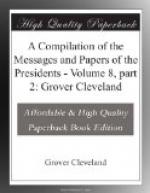To this end the President directs that the Post-Office Department and its dependencies in this capital shall be draped in mourning for a period of thirty days; that the several Executive Departments shall be closed on Wednesday next, the day of the funeral of the deceased, and that on all public buildings of the Government throughout the United States the national flag shall be draped in mourning and displayed at half-mast.
I have the honor to be, sir, your obedient servant,
FREDK. T. FRELINGHUYSEN.
[Footnote 15: Addressed to the heads of the Executive Departments, etc.]
EXECUTIVE MANSION, Washington, April 2, 1883.
Under the provisions of section I of the “act making appropriations for the naval service for the fiscal year ending June 30, 1884, and for other purposes,” approved March 3, 1883, the following-named officers of the Army and Navy will constitute a board for the purpose of examining and reporting to Congress which of the navy-yards or arsenals owned by the Government has the best location and is best adapted for the establishment of a Government foundry, or what other method, if any, should be adopted for the manufacture of heavy ordnance adapted to modern warfare, for the use of the Army and Navy of the United States, the cost of all buildings, tools, and implements necessary to be used in the manufacture thereof, including the cost of a steam hammer or apparatus of sufficient size for the manufacture of the heaviest guns:
Commodore Edward Simpson, United States Navy; Captain
Edmund O.
Matthews, United States Navy; Colonel Thomas G. Baylor,
Ordnance
Department, United States Army; Lieutenant-Colonel
Henry L. Abbot,
Engineer Corps, United States Army; Major Samuel S.
Elder, Second
Artillery, United States Army; Lieutenant William
H. Jacques, United
States Navy.
CHESTER A. ARTHUR.
EXECUTIVE MANSION, May 7, 1883.
In the exercise of the power vested in the President by, the Constitution, and by virtue of the seventeen hundred and fifty-third section of the Revised Statutes and of the civil-service act approved January 16, 1883, the following rules for the regulation and improvement of the executive civil service are hereby promulgated:
RULE I.
No person in said service shall use his official authority or influence either to coerce the political action of any person or body or to interfere with any election.
RULE II.
No person in the public service shall for that reason be under any obligations to contribute to any political fund or to render any political service, and he will not be removed or otherwise prejudiced for refusing to do so.
RULE III.
It shall be the duty of collectors, postmasters, assistant treasurers, naval officers, surveyors, appraisers, and custodians of public buildings at places where examinations are to be held to allow and arrange for the reasonable use of suitable rooms in the public buildings in their charge, and for heating, lighting, and furnishing the same for the purposes of such examinations; and all other executive officers shall in all legal and proper ways facilitate such examinations and the execution of these rules.




